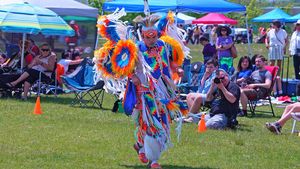Nick Harwood might be an industry plant but, by his logic, we all are. The lanky artist whose Instagram is literally "industryplant" certainly fits the bill. Like other industry plants, or artists with major label backing who present themselves as "home grown startups," his internet presence is near-impossible to trace and he's seemingly shot out of thin air. After producing two music videos for Dev Hynes' Blood Orange moniker, "Augustine" and "Sandra's Smile," Harwood fell under the radar before suddenly exploding back with co-directing credits on music videos for Porches' latest singles "Country" and "Find Me" and PC Music savant SOPHIE's debut tracks "It's Okay To Cry" and "Ponyboy." All in the last three months.
Related | The Sexiest Song of the Year Has Been Born With SOPHIE's 'Ponyboy' Music Video
Suddenly, his name has become intertwined in some of the best music videos of the year, yet his own story is largely a mystery, which is exactly what he wants. After scrubbing clean much of his digital footprint, including obscure school swim meet times, he's become a rare ghost in an industry full of, yes, industry plants. Yet, unlike someone like Raury, a popular target of industry plant conspiracy theorists, who he likes to image got "implemented into every home in Michigan" by an evil record executive or very real industry plants like Beyonce or Lana Del Rey, Harwood keeps his distance from the public and largely let's his art do the talking. Long before he wandered into the Bushwick apartment we were set to meet at, I'd only talked to him in bits and pieces through Instagram DMs about the latest music video he'd helped direct.
Outside of the funhouse mirror reality of social media and detached from producer and directing credits on some of the most exciting videos of the year, Harwood is strikingly inconspicuous. As his glasses dangle halfway down his nose and his short hair somehow shoots up in twenty different directions, he's quizzical, sharp, and lost in thought all at once. He's as concerned with the finding a purpose for his Instagram existence as he is with making sure I'd read the new New York Times profile on Brian Epstein about gay architects of rock.
Whip-smart and almost dizzying in his comprehension of the industry he's infiltrated, it's clear by the end of our conversation that Nick Harwood is only just getting started.

Photography: Ryan Duffin
OUT: Just to start, tell me about SOPHIE. How did that come about?
Nick Harwood: I've known her for a little bit and I'm obviously a huge fan of her music. We started having conversations a year ago about what she wanted to do for this era. She had all of these really amazing ideas and we just started to work together on conceptualizing them and building them out. It was beautiful because you really, especially with music videos, you never have a single-- it's all very quick, but I think SOPHIE is someone who operates on a very clear, direct, conceptual level.
You have time to breathe.
We have the time to plan it out and do it exactly how we wanted to.
With "It's Okay to Cry, that's really her debut singing in such a raw way. How did the video come together?
SOPHIE had a very clear idea of the story that she wanted to tell because the song is so personal and the lyrics are so narrative and visual already. There's a choreographer named Todd McQuade, who is incredible, and he was really instrumental in translating that story into something that can be told through the body and through the face. He knew how to articulate and translate these feelings that SOPHIE had into something that works as a music video.
I worked a lot on the sky and how the visual effects were going to look, but really this was a video that SOPHIE wanted to be performance-based. I think, being her first time on the camera, she totally knocked it out of the park in terms of how she was able to express-- it's not easy. It's fucking not easy.
It's nice because, in terms of who you've worked with in the past, SOPHIE is kind of the edgiest, in terms of identity. Do you consciously work with people who fall into the LGBTQ community, or is it natural?
I think it's important to always work with people with who you feel some sort of kinship with or maybe resonate with you in some sort of way. I think everyone I've worked with, whether they are on the searing edge of sound design like SOPHIE or soulful, amazing sound writers like Aaron Maine or Dev Hynes, everyone speaks to a different part. All of them have queer followings, which I think is because they tap into a certain emotional depth that, especially as a queer person, you have access to. I think your emotional intelligence is always going to be a little more acute just because of your experience in the world.
How do you bring yourself and your background to the videos?
Well, for the Porches videos, Aaron and I shared that history of basically growing up in a suburban background that we kind of look at as this rose-tinted, mystical, mysterious, enigmatic, romantic, sexy, but also torturous and dark place--a place that is laden with emotion. It's interesting to revisit that and think about my childhood and how I felt as a child. How I identify that now in retrospect is so different than how I identified it then as a kid.

Photography: Ryan Duffin
I feel like this has come up a lot in conversations lately, but how has social media impacted you and your creative process?
It raises my anxiety levels. It makes me feel defeated.
Have you thought about quitting?
Definitely. I mean, I've had to shift my public Instagram or had to justify it and had to come up with a purpose for its existence and I'm not sure that I've totally nailed it.
I still don't know what I'm doing with mine.
Nor do I.
I have a finsta.
Same. I had a finsta too that lasted a year. When I started it a year ago, I felt like I had something to say and that kind of ran out a couple of weeks ago. It's fun to think about these platforms and telling stories that are specific to the platform, but it's always been this torture of, 'what am I trying to fucking say?' It's such a competitive, popularity-measuring contest but, in terms of the creative process, it is beautiful and amazing. It's kind of filled the void that Tumblr used to occupy.
Like, there's a lot of amazing archival Instagram accounts or lots of amazing Instagram accounts that are calling people out for their references. It feels like there is an ecosystem that's eating itself now because it also has this really bad, homogenizing effect, where everyone is on the same aesthetic and same vibe. Just like there is a Spotify sound and there's a Soundcloud sound and a YouTube sound, there is an Instagram look and I think it's important to be conscious of that and undermine it when you can.
Especially as creatives, it feels like we have to be creating something all the time.
Right. There is that, the "what are you up to these days" aspect of it.
Yeah, but then people feel like they have to post every day and then once you post something you're really proud of, it feels like people don't really take the time to appreciate it because there is some new thing happening seconds later.
It becomes really toxic in that respect, but it's more about seeing things on Instagram and being inspired by them and being like, 'Okay, great. This is what we're not going to do.'
It's the anti-mood board.
It's the anti-mood board. That's a great way to put it.

Photography: Ryan Duffin
Our culture has such a short attention span now so I'm wondering, when you make music videos, how do you approach them in a way that gives them longevity?
I think it really depends. Music videos are such a weird format--they have such built in, formal boundaries. For the SOPHIE video, it's about performance. It's a performance video. That's what you're selling your viewer on but, for the Porches videos, it's more like this is a tone, this is a view, this is a world. Then, Dev's videos are about him and the world he occupies and the people that he brings into that world.
I always try to work on videos where there's something about them that feels very urgent and now and bleeding 2017, but something that won't feel that way once this year is over, you know? It'll feel just as pungent and potent after the fact. How I go about achieving that, I don't know. There's something that is kind of ineffable. I don't know if I've even succeeded at doing it.
At least we're trying.
Yeah. I think it's important to try for sure.
What do you do when you're not doing all of this work? How do you unwind?
I guess I go through phases. I think of myself like a little torrent. Sometimes I'm leeching and sometimes I'm seeding. I feel like I'm just off of a big seeding phase so I'm doing some more leeching and trying to slurp it all in--seeing movies or reading and trying to digest a lot of stuff. Also, I've never lived in a place for more than a year, so my vibe is I want to make my living space very nice and pleasant.
You're nesting.
My nest. Exactly. My den. I'm notoriously spartan and minimal when it comes to the investment that I put into my little nest. Some people are just not homebodies, but I want to be more of a homebody because I think it's important to have some roots, have some hooks. A bed to make is really important for your mental stability--especially in 2017.
Do you have any goals in mind for 2018?
I don't want to jinx it, but I do want to work on things that aren't music videos. That's one thing, but I think music videos are an amazing-- a good music video is like the peak of Western civilization.
How did you get into directing music videos?
I was in music journalism for a couple years and was always Mr. Music Guy--that was kind of my entrance into New York. I went to film school and that had always been a competing passion, so I think that music videos are a good way to put those two interests together. You know, I've been reading a lot about Brian Epstein. There was an amazing article actually in the New York Times, did you read this article about the gay architects of rock?
No. Send it to me.
It's fucking good. It's basically about how there were all these music managers in the 70s and 80s who created Mick Jagger and this kind of archetype of the rock star. I think there's something about being really in tune to performance and self-representation and affect and twitches and gestures and every kind of minuscule, microscopic molecule that goes into how someone comes across to you and how that makes you feel that queer people are especially privileged to be able to tap into.
It's a way of reading someone else and signaling that we're very semiotic people. That's something that journalism and filmmaking have in common--this ability to register people and communicate wordlessly. I'm sure you're doing it to me right now just like I'm doing it to you. It's just how we're programmed to be.

Photography: Ryan Duffin
It's interesting to see how much some things have shifted within the community. Growing up, the face of the community were these really white, heteronormative people--it was people like Neil Patrick Harris and Ellen DeGeneres.
I think it still is. Homonormativity is something that I've thought a lot about recently because it is, even on my own personal journey and my relationship with homonormativity, it is very important to be conscious of those representations. It's never as easy and cut and dry as we think. Ellen Degeneres was a huge moment and very important for her time, but we look back on it now, and people did then as well, and identify the problems and privileges she had as an attractive, rich, white cisgender woman. I don't know. Is it not a cop out to say everything is problematic, but also maybe doing good work as well?
Everything has two sides to it.
Kind of like Chanel. See both sides.
I know. Frank Ocean is another great example of this for me. Look at the "Nikes" video where he's covered in glitter.
What did you make of that?
I loved the video.
What did you make of the glitter?
I thought it was really cool. I like that he's really embracing this queer side of himself that maybe three or four years ago wouldn't have happened. I feel like we're getting into a new space now. What did you make of the video though?
I liked the video. I love Tyrone Lebon's work. I think it's really, really amazing. I think it was a really good simulation of what it feels like to scroll on Tumblr and Instagram and be inundated by images and they did a really good job of capturing that. Frank is an interesting one for sure.
Yeah. People like him and James Blake and King Krule, for example, those kind of artists who shy away from the public image I find more interesting.
That's a public image as well. I think privacy is that last form of rebellion. To hold back is something we don't know how to do anymore, so people that are able to do that, especially with their public images, I have a lot of respect for. SOPHIE continues to do an amazing job at having a firm control over what she lets out, in the same way as any of these artists that you named.
Do you want to do that in terms of your own work and public image?
I don't know. I really don't know. It's important to think about it, but I'm not really sure.
I mean you are kind of a mystery right now anyways.
Am I? I did recently go on a trek to remove my name from the internet. I like being able to control how much of me is out there.
What do you want on the internet about you? Just your music video work?
I don't know. That's such a good question. I think so. At this very moment, I would rather let the things that I've worked on speak on their own, but there are other stories that I want to tell that I'll hopefully have the opportunity to do. I always think about, for music videos especially, you have to think about what the press release is going to say, what day of the week it's going to come out, how it's going to be seen on an iPhone. All of those things are as important as what is happening in the video itself.
Presentation?
Exactly and roll out and how it lives. Being able to think about the medium as well as the message.
Photography: Ryan Duffin

















































































